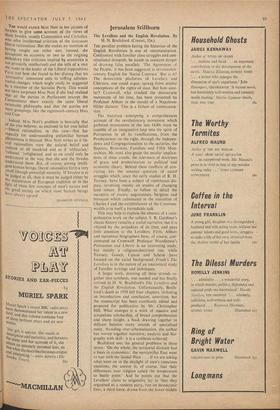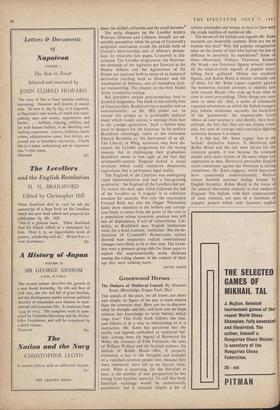Jerusalem Stillborn
The Levellers and the English Revolution. By H. N. Brailsford. (Cresset, 55s.) THE peculiar problem facing the historian of the English Revolution is one of communication.
Confronted with familiar class struggles and con- stitutional demands, he stands in constant danger of drawing false parallels 'The Agreement of the People,' it has been suggested, is seventeenth- century English for 'Social Contract But is it? The democratic platforms of Levellers and Chartists, one could argue, sprang from similar conceptions of the rights of man. But how simi- lar? Cromwell, who crushed the democratic movement of his time, has been presented by Professor Abbott in the mould of a Napoleon- Hitler dictator. This is a failure of communica- tion.
The historian attempting a comprehensive account of the revolutionary movement which gathered momentum in the late 1640s must be capable of an imaginative leap into the spirit of Puritanism in all its ramifications, from the Presbyterians on the right, through the Indepen- dents and Congregationalists to the sectaries, the Baptists, Brownists, Familists and Fifth Mon- archists. He must also grasp the secular implica- tions of these creeds, the relevance of doctrines of grace and predestination to political 'and economic theory. Behind these conflicts of con- viction lies the tenuous question of social struggles which, since the early studies of R. H Tawney, have been a subject of continuous dis- pute, revolving mainly on Studies of changing land tenure. Finally, to follow in detail the narrative of events. negotiations, bargains and betrayals which culminated in the execution of Charles 1 and the establishment of the Common- wealth is in itself ,a formidable task. This may help to explain the absence of a com- prehensive work on the subject. S R. Gardiner's classic history remains a useful narrative, but it is vitiated by the prejudices of its time, and pays little attention to the Levellers. Firth, Abbott and numerous biographers have, of course, con- centrated on Cromwell. Professor Woodhouse':; Puritanism and Liberty is an interesting study, but mainly a religious-doctrinal one, while TaWney, Gooch, Lipson and Schenk have focused on the social background. Frank's The Levelers is in the nature of an anatomical study of Leveller writings and techniques.
A larger work, drawing all these strands to-, gether into synthesis, was needed and has finally arrived in H. N. Brailsford's The Levellers and the English Rev. (Maims. Unfortunately, Brails; ford's death in 1958 left four chapters, including an introduction and conclusion, unwritten, but the manuscript has been excellently edited and prepared for publication by Mr. Christopher Hill. What emerges is a work of massive and scrupulous scholarship, of broad comprehension and sharp insight, a book drawing together in delicate balance many strands of specialised study. Avoiding over-schematisation, the author has woven together narrative, analysis and bio- graphy with skill : it is a synthesis achieved.
Brailsford sees the general problems in these terms: 'On the whole; the territorial division had a basis in economics: the mercantilist East went to war with the feudal West • . . if we are asking what went on in the daylight of men's conscious emotions, the answer is, of course, that their differences over religion raised the temperature to battle point.' And he points out that the Levellers' claim to originality lay in 'that they organised as a modern party, run on democratic lines, a third force, drawn from the lower middle
class, the skilled craftsmen and the small farmers!'
The early chapters on the Leveller leaders Walwyn. Overton and Lilburne himself are ad- mirably perceptive, while his grasp of Cromwell's enigmatic motivation avoids the pitfalls both of Carlyle's hero-worship and of Abbott's detesta- tion. In relatively few pages, Cromwell is illu- minated. The Leveller programme, the Petitions, the demands of the Agitators put forward at the Putney debates and the Agreements of the People are analysed both in terms of an historical derivation reaching back to Muenzer and the Anabaptists of MOnster, and of immediate tacti- cal manceuvring. The chapter on the New Model Army is essential reading.
But elsewhere certain preconceptions lead to
doubtful judgments. The book is not entirely free of false parallels. Brailsford was a socialist and an internationalist : as Mr. Hill points out, he viewed this project as 'a profoundly political study which would convey a message from him to the younger generation.' Such a motive must have its dangers for the historian. In his preface Brailsford revealingly refers to the revisionist Eduard Bernstein as 'the forerunner of us all.' The Liberal, or Whig, historians may have dis- missed the Leveller programme for the wrong reasons, but in challenging their gradualism Brailsford seems to lose sight of the fact that seventeenth-century England lacked a social structure which could transform democratic aspirations into a permanent legal reality.
The England of the Chartists was undergoing rapid industrialisation and had a fast-growing proletariat : the England of the Levellers did not. To mourn the dark ages which followed the fall of the Levellers as 'a tragedy' is to substitute emotion for analysis. Not only the reactionary Colonel Rich, but also the Digger Winstanley justly drew attention to the bribery and corrup lion likely to ensue from the grant of the vote to a population whose economic position was still one of dependence, if not of subservience. Cer- tainly, as Brailsford says, English institutions were, for a brief moment, 'malleable.' But the de- struction of Cromwell's Protectorate system showed how temporary radical constitutional changes were likely to be at that time. The Level- lers were a pressure group able for three years to exploit the unprecedentedly acute divisions among the ruling classes: in the context of their age they were nothing more.
DAVID CAUTE



























































 Previous page
Previous page